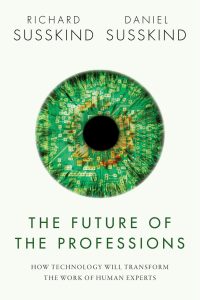Our special column focuses on a book by Richard Susskind and Daniel Susskind , titled “The Future of the Professions: How Technology Will Transform the Work of Human Experts” , that explores the profound influence technology has on established professions and the ever-changing realm of expertise in the modern digital era.
The authors, with their deep knowledge of law, technology, economics, and public policy, present a compelling argument that challenges conventional notions of professional work and raises questions about the future of human expertise.
 The book’s credibility and relevance are enhanced by a plethora of real-world examples and compelling case studies. The authors skillfully weave together historical context and present-day observations to shed light on the ever-evolving nature of professions, drawing attention to the current moment of a seismic shift with the advent of artificial intelligence and the proliferation of digital platforms.
The book’s credibility and relevance are enhanced by a plethora of real-world examples and compelling case studies. The authors skillfully weave together historical context and present-day observations to shed light on the ever-evolving nature of professions, drawing attention to the current moment of a seismic shift with the advent of artificial intelligence and the proliferation of digital platforms.
The authors present a vision of the future, highlighting the potential transformations that await various fields of expertise. They argue against the notion that professionals will become obsolete in the face of technological advancements, stressing the importance of adaptability, continuous learning, and the acquisition of new skills to thrive in this evolving environment.
Richard Susskind and Daniel Susskind effectively articulate the potential benefits of automation in the professions, such as increased affordability and accessibility, while acknowledging the challenges and concerns raised by skeptics. They also address issues related to job displacement, ethics, and the impact of technology on professional identity.
Overall, the book serves as a wake-up call, urging readers to critically examine the future of their careers and the broader implications for society. The authors’ comprehensive analysis is both enlightening and unsettling, making it an essential read for anyone seeking to navigate the uncertain terrain of our rapidly evolving digital age.































































